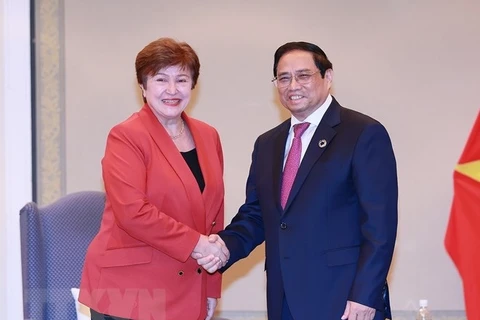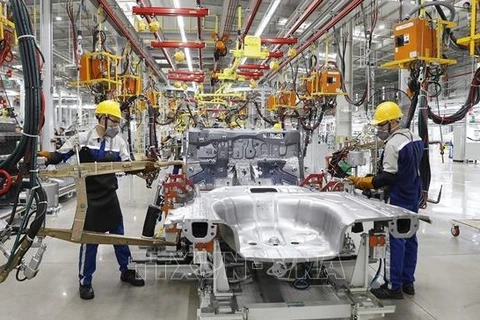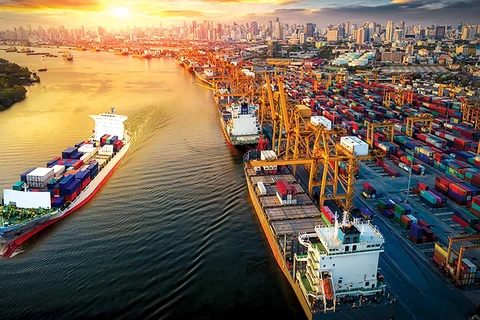Hanoi (VNA) - Vietnam can return to high growth rates over the medium term, as structural reforms are implemented, Division Chief of the International Monetary Fund (IMF)’s Fiscal Affairs Department Paulo Medas has said.
Medas led an IMF team to Vietnam from June 14-29 to hold discussions for the 2023 Article IV consultation with the country.
In an interview granted to the VietnamPlus e-newspaper under the Vietnam News Agency (VNA), he said that Vietnam’s economic growth is projected to recover in the second half of 2023, reaching around 4.7% for the year, supported by a rebound in exports and expansionary domestic policies. Inflation is expected to remain contained below the State Bank of Vietnam’s 4.5% ceiling.
The IMF predicts the world economy will continue facing difficulties in 2024 and can only recover in 2025, he said.
According to him, the measures taken by the central bank and the government such as interest rate cuts, tax reduction, and public investment and spending expansion have helped soften the impact of external and domestic headwinds.
The expert stated that the SBV was able to both contain price and liquidity pressures in a very challenging environment. Greater exchange rate flexibility and continued efforts to modernise the monetary policy framework will provide significant dividends.
Further monetary policy easing, and measures to boost credit growth, at this stage will likely be less effective and more risky, given global rates are likely to stay high for long, and banks in Vietnam are already facing rising non-performing loans and high loan-to-deposit ratios, he noted.
 Division Chief of the International Monetary Fund (IMF)’s Fiscal Affairs Department Paulo Medas (Photo: VNA) In this context, fiscal policy should take the lead in providing support to the economy and the poorest and most vulnerable groups, especially as the government has fiscal space. The planned increase in spending (wages and public investment) and cut in taxes will help boost domestic demand.
Division Chief of the International Monetary Fund (IMF)’s Fiscal Affairs Department Paulo Medas (Photo: VNA) In this context, fiscal policy should take the lead in providing support to the economy and the poorest and most vulnerable groups, especially as the government has fiscal space. The planned increase in spending (wages and public investment) and cut in taxes will help boost domestic demand.
“The current challenging economic environment and rising non-performing loans require the swift development of an action plan to protect financial stability and accelerating needed reforms. This would include strengthening the bank crisis management framework and improving bank regulation and supervision. The authorities should take advantage of the ongoing revision of the Law on Credit Institutions to develop more effective bank resolution and emergency liquidity frameworks,” Medas said.
To help Vietnam achieve its future macro-economic management goals, the IMF expert stressed that the government needs to maintain its reform efforts in the medium term to achieve the set medium and long term goals and become a developed economy by 2045 and to ensure total greenhouse gas emissions will be reduced to zero by 2025.
It is also necessary to reform the business environment by reforming administrative procedures, creating favourable conditions for the development of enterprises, invest in infrastructure, ensure renewable energy in the next 5-10 years, and pour capital into technology in education and training, he added./.
Medas led an IMF team to Vietnam from June 14-29 to hold discussions for the 2023 Article IV consultation with the country.
In an interview granted to the VietnamPlus e-newspaper under the Vietnam News Agency (VNA), he said that Vietnam’s economic growth is projected to recover in the second half of 2023, reaching around 4.7% for the year, supported by a rebound in exports and expansionary domestic policies. Inflation is expected to remain contained below the State Bank of Vietnam’s 4.5% ceiling.
The IMF predicts the world economy will continue facing difficulties in 2024 and can only recover in 2025, he said.
According to him, the measures taken by the central bank and the government such as interest rate cuts, tax reduction, and public investment and spending expansion have helped soften the impact of external and domestic headwinds.
The expert stated that the SBV was able to both contain price and liquidity pressures in a very challenging environment. Greater exchange rate flexibility and continued efforts to modernise the monetary policy framework will provide significant dividends.
Further monetary policy easing, and measures to boost credit growth, at this stage will likely be less effective and more risky, given global rates are likely to stay high for long, and banks in Vietnam are already facing rising non-performing loans and high loan-to-deposit ratios, he noted.
 Division Chief of the International Monetary Fund (IMF)’s Fiscal Affairs Department Paulo Medas (Photo: VNA)
Division Chief of the International Monetary Fund (IMF)’s Fiscal Affairs Department Paulo Medas (Photo: VNA) “The current challenging economic environment and rising non-performing loans require the swift development of an action plan to protect financial stability and accelerating needed reforms. This would include strengthening the bank crisis management framework and improving bank regulation and supervision. The authorities should take advantage of the ongoing revision of the Law on Credit Institutions to develop more effective bank resolution and emergency liquidity frameworks,” Medas said.
To help Vietnam achieve its future macro-economic management goals, the IMF expert stressed that the government needs to maintain its reform efforts in the medium term to achieve the set medium and long term goals and become a developed economy by 2045 and to ensure total greenhouse gas emissions will be reduced to zero by 2025.
It is also necessary to reform the business environment by reforming administrative procedures, creating favourable conditions for the development of enterprises, invest in infrastructure, ensure renewable energy in the next 5-10 years, and pour capital into technology in education and training, he added./.
VNA
























